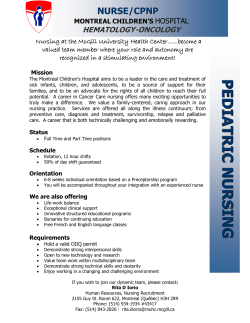
To: Champion Nursing Coalition Members From: The Future of
To: Champion Nursing Coalition Members From: The Future of Nursing: Campaign for Action, Center to Champion Nursing in America Re: Key Nursing Provisions in SGR Repeal Legislation Date: April 15, 2015 The legislation just sent to the President which provides for permanent repeal of the Medicare SGR contains a number of features and provisions that align with and advance key Future of Nursing: Campaign for Action goals and efforts. Below are highlights: 1) Advance Practice Registered Nurses (APRNs) are fully and consistently recognized as eligible provides throughout the bill. This is a real advance as many Medicare reform bills in the past have mostly referenced physician services. 2) A Medicare barrier to full APRN practice is removed by authorizing nurse practitioners to document evaluations for durable medical equipment. Under current law, an NP is required to obtain a physician's documentation certifying that a face-to-face encounter with that patient has taken place when ordering certain DME. This provision would remove the requirement for physician documentation and allow NPs to certify that the required face-to-face assessment with their patient has occurred when ordering DME products. 3) In an effort to promote greater use of chronic care management, the bill specifies that Medicare shall pay for these services and names APRNs as eligible providers. It also calls for a national education campaign to promote the use of chronic care management services in rural areas and in minority populations. 4) Beginning in 2019, APRNs and doctors can participate in an updated incentive payment initiative (Merit Based Incentive Payment System – MIPS) in which they will be measured for quality, resource use, clinical practice improvement activities (which notably must include: expanded practice access, patient engagement, patient safety and care coordination) and electronic health record adaptation. While a ways away, this new initiative is likely to provide fresh evidence of the relative effectiveness and efficiency of APRN care – both for purchasers and consumers. 5) An additional $620 million over two years in mandatory funding for the National Health Service Corps is provided. This should translate to up to $60 million for scholarship and loan repayment to train more nurse practitioners who will serve in rural and underserved areas (a 10 percent set aside). 6) A two year extension of the Maternal, Infant, and Early Childhood Home Visiting (MIECHV) programs which include nurse-led innovative models like the very successful Nurse-Family Partnership.
© Copyright 2025





















